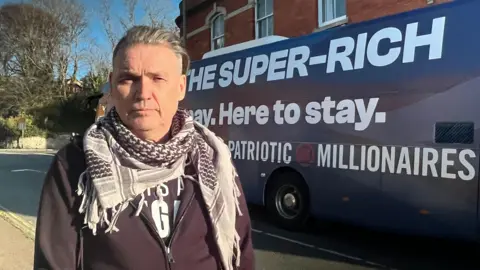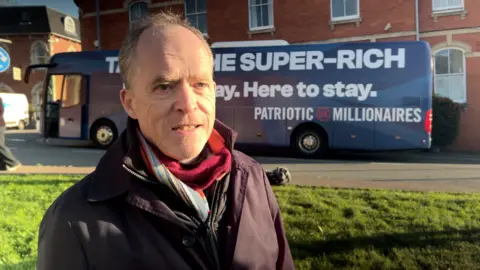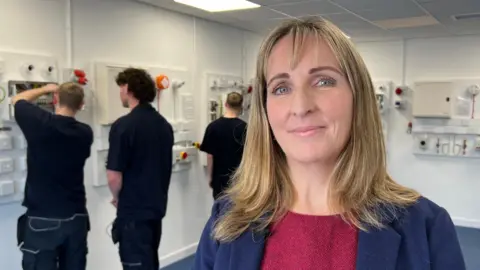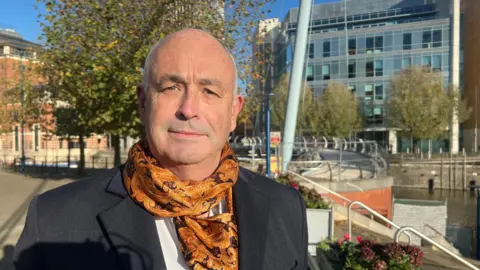Dave HarveyWest of England business and environment correspondent
 BBC
BBCA successful lawyer and a green industrialist have both called on the chancellor to raise taxes on “the super-rich” – including them – in the Budget.
Dale Vince, who founded a renewable energy firm, says he is in “the top 100 tax payers in Britain”, however he still believes he “should pay more”.
He, along with Gloucestershire solicitor Stephen Kinsella, have joined the campaign group Patriotic Millionaires UK, which is calling for a one-off tax on wealth over £10m.
But Chancellor Rachel Reeves said the UK does not need “a standalone wealth tax”.

Mr Vince, who is the founder of Ecotricity, added: “There’s a great disparity in our country between people who can’t feed themselves and people who have a great deal of wealth.”
“Our tax system created it and perpetuates it. People like me should pay more, it’s as simple as that.”
He is a major donor to the Labour Party, and has repeatedly argued that wealthy people should pay more tax. And the campaign he has joined is growing, with more than 85 other millionaires signing up.
Stephen Kinsella is far less well-known or controversial. A successful lawyer, he said he also joined the group because “most of us want to live in a fairer society”.
Mr Kinsella argued that the UK government “needs more money”, and that money will have to come from taxes.
“Either I will pay it, or somebody else will pay it,” he said.
At the Labour Party conference in September, Reeves appeared to rule out a specific tax on wealth.
She told Bloomberg TV: “We already have taxes on wealthy people; I don’t think we need a standalone wealth tax.”
The Patriotic Millionaire battlebus seen in Stroud this week is just one small skirmish in the war of words over Budget 2025.
There has been more speculation than ever over this year’s tax changes, and firms who build new houses say they are paying the price as sales stall.
Clarkson Evans chief executive Lindsey Young leads a team of electricians who wire up new homes.
“People are not sure what the policies are going to be, so they are holding back, they are sitting on their hands,” she said.

There is always a pause before a government budget, but this year has been much longer. The chancellor herself made an unprecedented speech about the ‘values’ underpinning her budget.
This sparked a blizzard of reports about which taxes will change. In the housing market changes to Stamp Duty, Council Tax, and a so-called ‘Mansion Tax’ have all been floated.
The result? Home buyers decided to wait until the Budget before signing on a big sale.
From its HQ in Gloucester, Clarkson Evans trains 300 apprentices in all aspects of electrical work. It is a four-year course, so the company needs long-term security to plan.
“Housebuilders will only build what they can sell, and at the moment their sales rates are much lower than usual,” said Ms Young.
“It’s having a real impact on what workforce we can employ now, and how many people we will have to build these 1.5m homes the government wants.”

It is not just housebuilding that has stalled. All kinds of firms have told me they are waiting on the Budget before deciding to hire more people, invest in new machines or buildings or expand their operations.
Phil Smith has heard this story from all sectors. As managing director of Business West he is connected to more than 10,000 small firms in the West and said he has seen a “real freeze” over the last three months.
“We’re talking farmers, we’re talking family businesses, limited liability partnerships, we’re talking landlords,” he said.
“Every time the Treasury attention turns on a sector, they stop doing anything.”
So what do Treasury ministers have to say about, well, saying too much?
A Treasury spokesperson reminded me the government “does not comment on speculation outside of fiscal events” (ie the Budget).
Many firms and economists would say this year they have done exactly that, not least in Rachel Reeves’ set piece speech and media interviews.
But the spokesperson insisted the Chancellor was only trying to “set out the context for the Budget”.
They added the UK government “will continue to build … on the priorities of the British people – cutting waiting lists, cutting national debt and cutting the cost of living.”




